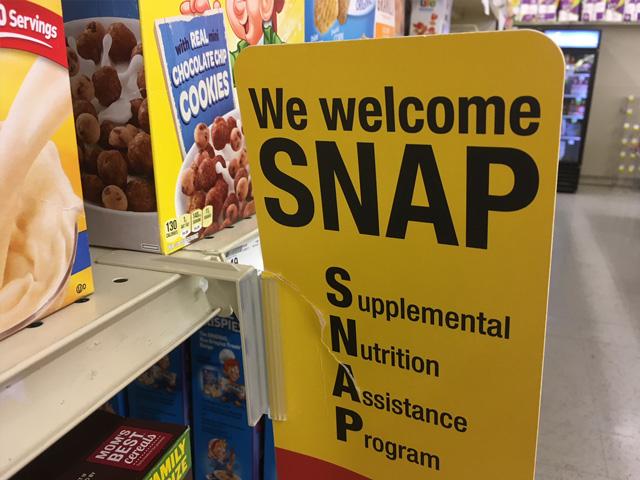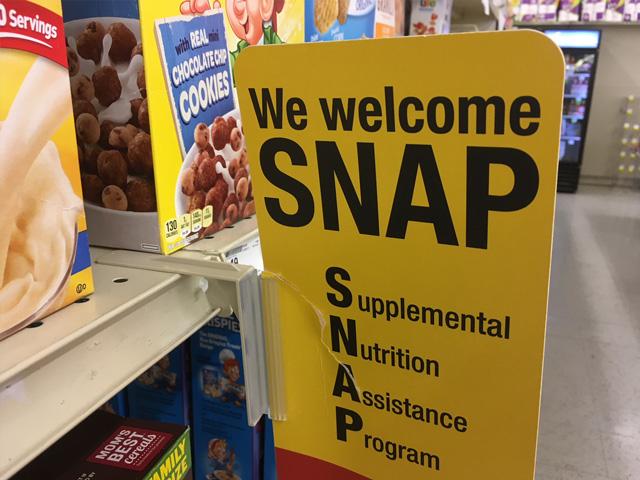Ag Policy Blog
A Broken Government Uses SNAP Recipients as Shutdown Leverage
Leaders of the world's most prosperous country now are preparing an unprecedented move to cut off food aid to their most vulnerable citizens.
The government shutdown affects the incomes of federal employees, but also now risks cutting off food-aid benefits for roughly 42 million who are on the Supplemental Nutrition Assistance Program (SNAP).
"Allowing hunger to deepen during a shutdown is not an inevitability; it is a policy choice," wrote Gina Plata-Nino, interim SNAP director for the Food Research & Action Center (FRAC). "Advocates must reassure households that October SNAP benefits have been funded and are available. If the Trump administration chooses not to fund SNAP in November, benefits may be delayed but will be reimbursed once the shutdown ends."
That term "policy choice" stands out because people who rely on SNAP are now being used as "leverage" in the shutdown debate. Both sides have suggested the other party is using SNAP recipients as leverage. That then ties back to some comments made Wednesday by celebrity chef Jose Andres when he addressed hundreds of global nutrition and agricultural advocates at the World Food Prize event in Des Moines, Iowa.
"There's no reason why anybody should be hungry in America, the richest country in the history of humanity," Andres said. He added, "What's the difference between people who are hungry in America, people who are hungry in Haiti or people that may be hungry in Ukraine? In America, it is a failure of bad policies. Because we are a country that we produce far more than we consume, there is no reason why anyone anywhere in America should go through moments of hunger."
The World Food Prize symposium was filled with messages from speakers criticizing governments around the world for "weaponizing hunger" as well.
Not too long ago, there was a coalition of agricultural and nutrition groups that would have pressed the federal government to avoid cutting off food aid. They would have at least spoken in one voice against the move. That coalition, like so many other things, has been broken.
P[L1] D[0x0] M[300x250] OOP[F] ADUNIT[] T[]
Kathy Underhill, CEO of the Des Moine Area Religious Council (DMARC) which runs food pantries in the central Iowa area, said in a press conference about SNAP on Thursday, "This would be absolutely unprecedented in the history of the SNAP program. We've never had benefits delayed or fail to go out on time."
The idea that nearly 42 million people could be cut off from an average of $6 a day in SNAP benefits is happening at the same time the country is arguing about importing more beef because it is considered too expensive. And the conversation involves importing beef from a country getting a $20 billion bailout that the Treasury secretary granted. By comparison, it takes about $9 billion to fund SNAP for a month.
As USDA reports, 67% of SNAP participants are either children, elderly adults or adults with some form of disability. SNAP beneficiaries earn, on average, earn less than $1,000 a month in gross income, USDA stated last year.
Just before the shutdown, USDA also announced it would end its annual report on food insecurity. That came after the One Big Beautiful Bill Act cut SNAP spending and tightened eligibility, though most of the impacts won't be felt until 2028. "These redundant, costly, politicized, and extraneous studies do nothing more than fearmonger," USDA stated.
If the federal government isn't reopened early next week, at least half the states in the country have already stated they will cut off benefits to the program. Benefits could be delayed to low-income people on the program even if Congress passes a funding bill early next week.
California, Texas, Florida, New York and Pennsylvania have the largest number of SNAP recipients, followed by Illinois, Michigan, Ohio, Georgia and Massachusetts. That's a mix of large blue and red states that combined have 25.4 million people in the program. Those 10 states also have a combined 229 House members and 20 senators as well.
National Grocers Association (NGA), which represents independent supermarkets, raised concern and pressed the need to reopen the government to fund SNAP and WIC so families do not lose benefits.
"Independent grocers are often the only source of fresh produce, dairy, and other nutritious essentials for millions of families, veterans and seniors that rely on federal nutrition assistance to make ends meet. A lapse in funding will disrupt food access, creating instability for shoppers, retailers and communities alike," said Greg Ferrara, president and CEO of NGA.
Food banks had already sounded alarm on concerns about SNAP cuts in the One Big Beautiful Bill Act last summer. As food banks told DTN back in June, typically for each meal a food bank or pantry provides in an area, SNAP provides nine meals.
A government can find ways to bail out allies, build a new ballroom at the White House, or reopen offices for farmers. But it appears everyone would rather take the unprecedented step of cutting off food aid to its poorest people because doing so is perceived as good political messaging for both sides.
See, "Andres: Food Is a Universal Right," https://www.dtnpf.com/…
Also see, "Midwest Food Banks Warn They Can't Fill Gap if SNAP is Cut in Budget Bill," https://www.dtnpf.com/…
Chris Clayton can be reached at Chris.Clayton@dtn.com
Follow him on social platform X @ChrisClaytonDTN
(c) Copyright 2025 DTN, LLC. All rights reserved.






Comments
To comment, please Log In or Join our Community .